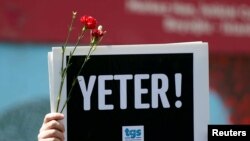In dawn raids, Turkish police enforced arrest warrants on 35 media workers, including journalists, in connection with last year’s coup attempt. Local media reports say at least nine people were detained. The latest arrests add to the more than 150 reporters already jailed in a crackdown following the botched military takeover in July of last year.
Turkish media, quoting an anonymous judicial source, report the arrests were in connection with the use of Bylock, a smartphone encrypted messaging application. Prosecutors allege ByLock is used only by followers of the Islamic cleric Fethullah Gulen, who is blamed for masterminding the takeover attempt in which nearly 250 people died. Tens of thousands of people have been detained or purged from their jobs for using or receiving messages from ByLock users.
The use of ByLock as evidence, especially against journalists, is causing growing concern. “RSF (Reporters Without Borders) is concerned by an automatic use as evidence of ByLock application to arrest journalists,” said Erol Onderoglu, Turkey representative for the Paris-based media freedom group. Journalists like Kadri Gursel (a prominent Turkish journalist on trial) have also been behind bars for more than nine months for "receiving calls from people who got ByLock on their mobile. This abuse must end," Onderoglu said.
Several journalists being sought in the latest wave of arrests had worked for newspapers and TV stations that were closed down for links to Gulen. Among those arrested is Burak Ekici, the web editor for the left-leaning newspaper BirGun, which is a strong critic of Gulen as well as President Recep Tayyip Erdogan. The state-run Anadolu news agency reported Ekici is accused of being a “member of a terrorist organization.”
Critics of the ongoing crackdown accuse the president and his government of using emergency powers introduced after the failed coup to increasingly silence critical reporting. “I believe that the state of emergency has brought all the arbitrary tools, all the disproportionate measures to silence, not only those accused of involvement in the coup attempt, but all Turkish opposition circles in all its diversity,” declared RSF’s Onderoglu.
Last month, the trial started for 17 journalists and executives of Cumhuriyet, Turkey’s oldest newspaper and staunch critic of both the president and Gulen. The defendants are all charged with terrorist offenses and some face decades in prison if convicted. Four of the accused, including some of the country’s most well-known writers, have remained behind bars for more than eight months.
The Turkish Journalists Association says 149 media organizations closed and 169 journalists were jailed under emergency rule. Turkey now ranks as the world’s biggest jailer of journalists, according to rights groups.
President Erdogan has defended the arrests, saying journalists are "not above the law" and that with the exception of two, all those held are for offenses unrelated to their craft. As in the case of the latest arrest warrants, most jailed reporters are being held on terrorist charges.
Defenders of the crackdown argue that Gulen has built up a vast network within the state and wider society, including the media, which they say he continues to use against the government. Gulen denies any involvement in the attempted coup.
Critics point out that given the "catch-all" nature of anti-terror legislation, it can include legitimate journalism. One of the most common laws used against writers is “actions that support a terrorist organization, while not being a member,” that has been interpreted by prosecutors as including articles criticizing the crackdown and the president.
The crackdown is extending abroad. On August 3, Swedish-Turkish journalist Hamza Yalcin was arrested at Barcelona’s El Prat airport on an international arrest warrant requested by Turkey.
French reporter Loup Bureau was detained last month on the Turkey-Iraq border under anti-terror legislation. Bureau was reportedly being held because images were found on his laptop of him with Syrian Kurdish fighters accused by Ankara of being terrorists linked to the Kurdish insurgent group, the PKK.
German-Turkish journalist Deniz Yucel of Germany's Die Welt newspaper has been jailed since February on charges of “spreading terrorist propaganda.” In April, the Turkish president declared Yucel would never be allowed to return to Germany “as long as I remain in power.”




